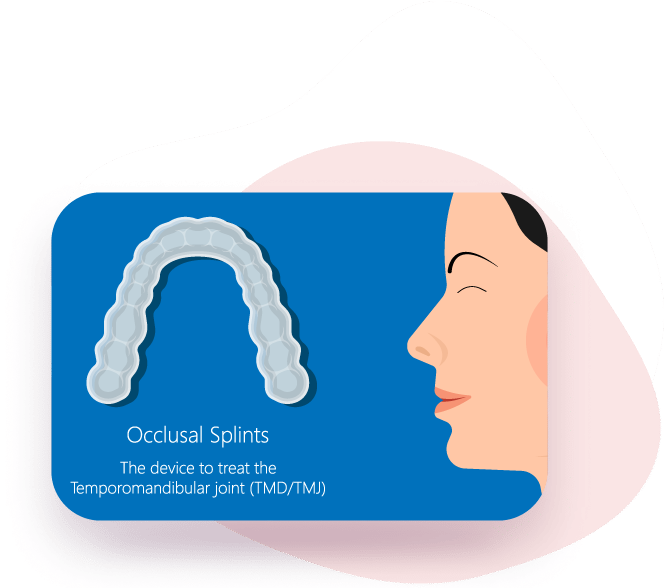Your dental health is crucial, and issues like teeth grinding can significantly impact it. If you’re dealing with teeth grinding or clenching, you might benefit from using a dental night splint, also known as an occlusal splint.
Occlusal splints are designed to protect your teeth and alleviate pain caused by these habits. At The Dentist at 70 Pitt Street, we specialise in providing custom solutions to safeguard your oral health.
What is an Occlusal Splint?
An occlusal splint is a hard plastic oral appliance custom-made to fit over your upper or lower teeth. It is primarily used to prevent teeth grinding and clenching, known as bruxism. This dental splint helps in protecting your teeth from excessive wear, reducing jaw muscle tension, and alleviating neck pain.
People often grind their teeth subconsciously, especially when stressed or sleeping. This habit can cause significant damage to your teeth and jaw joints.
Occlusal splints, also referred to as bite splints or night guards, are designed to counteract this damage. They are removable and worn at night to help relax your jaw muscles and protect your teeth from grinding.
Occlusal splints can be made for either the upper or lower teeth, depending on the individual’s needs and the dentist’s recommendation.
What Can an Occlusal Splint Help With?
Occlusal splints provide significant relief and protection for individuals suffering from teeth grinding and clenching, especially those with temporomandibular joint (TMJ) disorders.
These dental splints are designed to be worn over the upper teeth and serve multiple purposes to enhance oral health and overall well-being. Here are some of the key benefits of using an occlusal splint:
- Prevent Teeth Wearing: Continuous grinding and clenching can cause severe wear on the enamel of your teeth.
Occlusal splints act as a protective barrier, preventing the upper teeth from making direct contact with the lower teeth, thereby reducing wear and tear.

- Protect Crowns or Implants from Damage: If you have dental crowns or implants, grinding and clenching can cause them to chip, crack, or become loose.
An occlusal splint cushions these restorations, providing an extra layer of protection and extending their lifespan. - Reduce Jaw Pain: Grinding and clenching can lead to significant jaw pain and discomfort.
By wearing an occlusal splint, the pressure exerted on the jaw muscles is evenly distributed, which helps in reducing pain and discomfort in the jaw area. - Relieve Tension in Jaw Joints and Neck Muscles: The temporomandibular joint is responsible for connecting your jaw to your skull, and excessive clenching can cause tension and pain in this area.
Occlusal splints help in alleviating this tension, providing relief not only to the jaw joints but also to the neck muscles that may be affected by TMJ disorders. - Minimise Unexplained Morning Headaches and Facial Pain: Many people who grind their teeth at night wake up with unexplained headaches and facial pain.
By using an occlusal splint, the strain on the jaw muscles and temporomandibular joint is reduced, which can significantly decrease the frequency and intensity of morning headaches and facial pain. - Improve Sleep Quality: By reducing teeth grinding and jaw clenching, occlusal splints can help improve overall sleep quality.
The Importance of Using an Occlusal Splint
If you suffer from bruxism and do not use a night guard or bite splint, it can have severe implications for your dental health. Here are the key reasons why using an occlusal splint is essential:
- Prevents Enamel Wear: Bruxism causes clenching and grinding, leading to rapid wear of the tooth enamel, which is the hard, protective outer layer of your teeth.
- Protects Against Bacterial Invasion: Once enamel wears down, the soft internal part of the tooth, called dentin, becomes exposed, making the teeth susceptible to bacterial infections.
- Prevents Severe Dental Issues:
- Cavities
- Infections
- Need for root canals
- Crowns
- Veneers
- Cost-Effective Prevention: While there is an upfront cost, using an occlusal splint can potentially save you from more expensive dental treatments in the long run.
- Absorbs Clenching and Grinding Forces: The splint acts as a barrier between the upper and lower teeth, absorbing the forces generated by bruxism and preventing excessive enamel wear.
- Alleviates TMJ Disorder Symptoms: Occlusal splints help manage temporomandibular joint (TMJ) disorder symptoms, which often accompany severe cases of bruxism:
- Reduces jaw pain
Minimises headaches - Eases difficulty in chewing
- Reduces jaw pain
- Comprehensive Oral Health Management: By protecting your teeth from damage and managing TMJ disorder symptoms, occlusal splints provide a holistic approach to maintaining your oral health.
Am I the Right Candidate for Occlusal Splints?
You might be a good candidate for occlusal splints if you experience any of the following symptoms:
- Jaw pain
- Difficulty chewing food
- Limited mouth opening movement
- Morning headaches
- Increased teeth sensitivity
- Suffering from temporomandibular joint disorder (TMJ)

How is an Occlusal Splint Fitted
at The Dentist at 70 Pitt St in Sydney?
Getting an occlusal splint fitted is a straightforward process. Here’s what you can expect:
- Dental Impressions: Your dentist will take detailed impressions of your upper and lower arches. This is done to create a mould of your teeth, ensuring the occlusal splint fits perfectly and provides maximum protection and comfort.
- Digital Scanning: In some cases, instead of traditional impressions, digital scanning technology may be used to create a 3D model of your teeth for even more precise fitting.
- Custom Fitting: The impressions are sent to a dental lab where a custom-fitted removable dental appliance is crafted. This appliance is designed to align perfectly with your teeth, offering an optimal fit that aids in protecting the teeth and relieving jaw joint pressure.
- Final Adjustments: Once the custom splint is ready, you will return to your dentist for a fitting. The dentist will make any necessary adjustments to ensure the splint fits comfortably and effectively.
While occlusal splints are generally safe, some people may experience temporary discomfort or changes in their bite. Your dentist will discuss any potential risks with you during your consultation.
What Happens After I Have an
Occlusal Splint Fitted?
After receiving your custom-fitted occlusal splint, it’s important to follow these guidelines for proper usage and maintenance:
General Usage
- Wear as Instructed: Follow your dentist’s instructions on how to use the dental splint. It is typically worn at night, but some individuals may need to wear it during the day.
- Initial Discomfort: You may experience tightness and increased salivation initially, but this is normal and should subside within a month.
Daily Care and Cleaning
- Rinse with Cold Water: Always rinse your splint with cold water after use.
- Proper Storage: Store the splint in a moist tissue or cold water overnight to maintain its shape.
- Rehydration: If the splint dries out, soak it in water for 24 hours to restore its original shape.
- Weekly Cleaning: Clean the splint weekly by soaking it in Steradent for an hour.
Maintaining Correct Fit
- Regular Usage: Use your dental splint at least every 2 weeks to prevent tooth movement. Inconsistent use can cause your teeth to shift, requiring realignment or a new splint.
- Monitor Fit: Regularly check the fit of your splint and consult your dentist if adjustments are needed.
- Regular Check Ups: Schedule follow-up appointments with your dentist to ensure the splint continues to fit properly and is effectively addressing your symptoms.
How Much Does an Occlusal Splint Cost in Sydney?
The cost of a new occlusal splint at The Dentist at 70 Pitt Street is $700. Realignment services incur an additional fee. Contact us for a detailed cost breakdown or any questions about the procedure.
We also offer interest-free payment plans through direct debit for existing clients. For more information, please contact our Practice Manager at (02) 9233 3399.
Meet Our Team

Dr. Catherine-Anne Walsh
Dentist

Christine
Fischer-Stoess
Hygienist

Dr. Yvonne Chow
Dentist - Sedation
FAQs
Below are some of our most frequently asked questions about occlusal splints:
Occlusal splints are typically made from hard acrylic or thermoplastic materials. These materials are durable and designed to withstand the pressure from clenching and grinding, providing long-lasting protection for your teeth and jaw joints.
Yes, there are different types of occlusal splints, including maxillary (upper) and mandibular (lower) splints. The type of splint prescribed depends on your specific needs and the nature of your bruxism or TMJ disorder.
It's generally recommended not to eat while wearing your occlusal splint. You can drink water with it in, but it's best to remove the splint for other beverages to prevent staining or damage.
It usually takes about one to two weeks to get a custom-fitted occlusal splint made. The process involves taking dental impressions and sending them to a lab where the splint is crafted to fit your teeth perfectly.
A dental splint should be replaced if it becomes worn out, cracked, or no longer fits properly. Regular dental check-ups will help determine when it’s time for a replacement, typically every few years depending on usage and wear.
Initially, occlusal splints may feel tight and cause increased salivation, but most patients get used to them within a few weeks. They are custom-fitted to ensure maximum comfort and effectiveness during use. Your dentist can make adjustments to ensure optimal comfort if you experience persistent discomfort.
For the best results, it is recommended to wear your occlusal splint every night. Consistent use helps protect your teeth from grinding and clenching, alleviating symptoms and preventing further dental issues.
If your occlusal splint no longer fits properly, schedule an appointment with your dentist. Your dentist can adjust the fit or, if necessary, take new impressions to create a new splint that fits comfortably and effectively.
General Information Disclaimer: The content provided here is for informational purposes only and is not intended as medical advice, diagnosis, or treatment. Always seek the advice of your health professional with any questions you may have regarding a medical condition. The information on this site is general in nature and may not reflect current medical developments or research. Your reliance on any information provided by this site is solely at your own risk.
New Patient Offer
1st Visit comprehensive Examination,
Check-up, Teeth Cleaning for New Patients
- Pay Only $300 (regular price: $486)
- Comprehensive Oral Examination and Consult ($65)
- 2x bite-wing x-rays ($42 each)
- 1x Dental Panoramic OPG x-ray ($100)
- Comprehensive Scale & Clean ($210)
- Fluoride treatment ($27)
